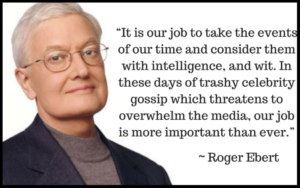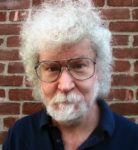This is the 19th in a series of articles about winners of the NSNC’s annual Ernie Pyle Lifetime Achievement Award.
By Dave Astor
NSNC Archivist
 Because of serious health issues, Roger Ebert didn’t travel to Detroit to receive our 2011 Ernie Pyle Lifetime Achievement Award. But the famed film critic did appear from Chicago via Skype.
Because of serious health issues, Roger Ebert didn’t travel to Detroit to receive our 2011 Ernie Pyle Lifetime Achievement Award. But the famed film critic did appear from Chicago via Skype.
“It is my great honor to accept this award from the National Society of Newspaper Columnists,” Ebert told attendees. “I grew up regarding newspaper columnists as the most noble and brilliant of human beings, and nothing I have seen since has caused that opinion to change.
“It is our job to take the events of our time and consider them with intelligence, and wit. In these days of trashy celebrity gossip which threatens to overwhelm the media, our job is more important than ever.”
Before the Pyle winner spoke, 2010-2012 NSNC President Ben Pollock noted that “it’s a great, it’s a humbling honor to introduce Roger Ebert.” Ben went on to mention several of Ebert’s accomplishments, including being the first film critic to win the Pulitzer Prize for criticism — in 1975, when the Chicago Sun-Times staffer was still in his early 30s.
Ben also praised Ebert for being a “conversational” writer who not only reviewed films, but also did plenty of reporting about movie-related matters. “Roger always is clear and his writing style is deceptively simple,” Pollock observed. Ebert’s writing also included plenty of passion, humor, knowledge, intelligence, and historical perspective.
(A thank you to Ben for sending me a link to his “Brick” blog’s June 26, 2011, post containing the transcript of his and Ebert’s remarks — from which I took the above quotes.)
I also had a conversation about Ebert with Ben last month, and he recalled wryly that Detroit conference host Brian O’Connor “warned me in a whisper as I took the stage that if I tripped over the main wire to his laptop on the lectern, severing the connection to Chicago, well…that’s not printable.”
Ben added: “The board choosing Roger was the beginning of NSNC loosening its already plastic definition of ‘columnist.’ Because Roger in print was a critic, and those folks have their own group and awards. But art criticism is a form of column — it’s analysis and commentary, and a service to readers, and when done right includes journalistic research that at times includes interviews. The clincher was that in his last years, Roger turned to blogging, which was definitely in the column mold…”
Ebert (1942-2013) had severe health problems during the final 11 years of his life — suffering from papillary thyroid cancer, salivary gland cancer, and more. He eventually lost his ability to speak — using a computerized voice system to communicate, including to the NSNC during his Pyle speech.
The Illinois native joined the Sun-Times in 1967, and remained there until his death. Starting in 1975, Ebert also became widely known for his TV collaboration with Chicago Tribune film critic Gene Siskel. On their show, the two bantered humorously while discussing movies, and created and trademarked the phrase “Two Thumbs Up” for films they both liked. After Siskel died in 1999, Ebert continued the show with various co-hosts.
Ebert’s reviews were syndicated to more than 200 newspapers, and he also published numerous books — including collections of his reviews.
Roger’s widow, Chaz, appeared and spoke at our 2014 conference in Washington, DC.
***
Dave Astor writes the weekly “Montclairvoyant” topical-humor column for Baristanet.com, blogs weekly at DaveAstorOnLiterature.com, and is the author of the 2017 book “Fascinating Facts About Famous Fiction Authors and the Greatest Novels of All Time: The Book Lover’s Guide to Literary Trivia.“


